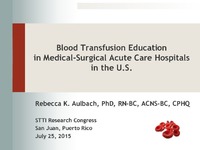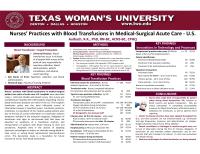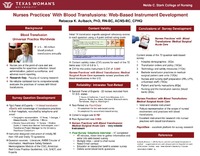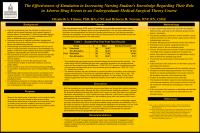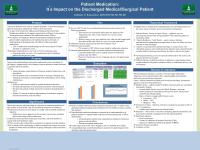| dc.contributor.author | Aulbach, Rebecca K. | en |
| dc.date.accessioned | 2016-03-17T12:53:40Z | |
| dc.date.available | 2016-03-17T12:53:40Z | |
| dc.date.issued | 2016-03-17 | |
| dc.identifier | INRC15E07 | en |
| dc.identifier.uri | http://hdl.handle.net/10755/601718 | |
| dc.description | <p>Research Congress 2015 Theme: Question Locally, Engage Regionally, Apply Globally. Held at the Puerto Rico Convention Center.</p> | en |
| dc.description.abstract | <p>Session presented on Saturday, July 25, 2015:</p>
<p><strong>Purpose:</strong> The purpose of this presentation is to report on the state of the science of hospital-based blood transfusion education of nursing staff in medical-surgical acute care hospitals. Hospitals from across the U.S. were randomly selected with 143 valid responses used to describe the education of nurses and patients regarding transfusion practices.</p>
<p><strong>Methods:</strong> Three of the seven research questions addressed the comprehensive scope of nurses', nursing staff, and patient's blood transfusion education while in an medical surgical acute care. A valid and reliable web-based survey developed by the author, 'Nurses' Practices with Blood Transfusions: Medical-Surgical Acute Care,' was used to report practices related to medical-surgical nurses of that hospital; only one survey was completed per hospital. A random selection of U.S. hospitals with a nurse executive or leader who was a member of the American Organization of Nurse Executives (N'= 2082,'n'= 807) were contacted by postal letter to participate in the study. The data was collected via the web-based survey administered via PsychData. Following four months of data collection, 148 valid responses were obtained in PsychData yielding a response rate of 18.3%.</p>
<p><strong>Results:</strong> The hospital's transfusion policy was the most influential source of information for nurses because it detailed and therefore prescribed nurses' transfusion practices. Surveillance of the patient was challenged due to the lack of current information included in the education programs, delegation of transfusion vital signs to non-licensed staff who were not educated on symptoms of a transfusion reaction, and transportation of a patient with blood infusing to tests and procedures by personnel whose knowledge of transfusions was largely unknown. Fever, chills/rigors, shortness of breath, and itching were taught on an annual basis in almost all of the hospitals however the comprehensive list of 33 symptoms of a transfusion reaction from the Biovigilance Network was only incorporated into the education program of RNin 22% of the hospitals.</p>
<p><strong>Conclusion:</strong> The implications for nursing emanating from this study were the need to collaborate with the transfusion service to update information in the policy and the blood transfusion education programs; include non-licensed staff and other test and procedure staff in compulsory blood transfusion education</p> | en |
| dc.format | Text-based Document | en |
| dc.language.iso | en | en |
| dc.subject | Blood Transfusion | en |
| dc.subject | Nurse Education | en |
| dc.subject | Patient Education | en |
| dc.title | Blood transfusion education in medical-surgical acute care hospitals in the U.S | en |
| dc.title.alternative | Global issues within hospital facilities | en |
| dc.type | Presentation | en |
| dc.rights.holder | <p>
All rights reserved by the author(s) and/or publisher(s) listed in this item record unless relinquished in whole or part by a rights notation or a Creative Commons License present in this item record.
</p><p>
All permission requests should be directed accordingly and not to the Sigma Repository.
</p><p>
All submitting authors or publishers have affirmed that when using material in their work where they do not own copyright, they have obtained permission of the copyright holder prior to submission and the rights holder has been acknowledged as necessary.
</p> | |
| dc.description.note | <p>Items submitted to a conference/event were evaluated/peer-reviewed at the time of abstract submission to the event. No other peer-review was provided prior to submission to the Henderson Repository.</p> | en |
| dc.type.category | Full-text | en |
| dc.evidence.level | N/A | en |
| dc.research.approach | N/A | en |
| dc.contributor.department | Beta Beta (Houston) | en |
| dc.author.details | Rebecca Aulbach, RN, RNC, ACNS-BC, CPHQ | en |
| dc.conference.name | 26th international Nursing Research Congress | en |
| dc.conference.host | Sigma Theta Tau International | en |
| dc.conference.location | San Juan, Puerto Rico | en |
| dc.date.conferenceyear | 2015 | |
| dc.contributor.affiliation | Texas Woman's University, Houston, Texas, USA | en |
| dc.description.reviewtype | Abstract Review Only: Reviewed by Event Host | en |
| dc.description.acquisition | Proxy-submission | en |
